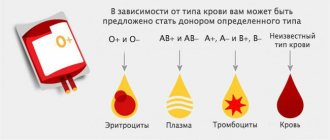More and more often in our lives people suffer from serious illnesses or may find themselves in life-threatening situations. At such moments a person is on the verge between life and death. Of course, doctors always fight to save a person, but when there is a large loss of blood, donor blood comes to the rescue.
In St. Petersburg, as in other large cities of Russia, many stations have been created for collecting donor blood, which cooperate directly with city hospitals. Such points register everyone who wants to donate blood, check their health status and keep records of rare groups.
Blood is collected both in whole form, as well as plasma and platelets. Now the blood is immediately divided into plasma and red blood cells.
Important! The plasma is quarantined for six months, it is carefully checked, and the red blood cells are sent to medical institutions after 42 days.
What are the requirements for donors in St. Petersburg?
In order to get into the ranks of those donating blood, you need to decide on the donation point, where to go, it is better to first call the administrator and clarify all the necessary details:
- What are the requirements for a donor, how to prepare for the procedure
- What is the cost of the service
- Specify the location address
The title of donor is considered honorable, and a number of benefits and rewards are provided for those who regularly donate blood.
1.The first stage is registration, where the donor will be given a card with personal data.
2.Then you go to undergo tests and go through doctors, after this procedure the patient is assigned a personal individual number and entered into the database.
3. In case of successful tests, you can go for a blood draw, either it will be free and then you will be entitled to food, or you will be paid a certain amount, which is impossible to find out in advance, everything will depend on the amount of sampling. The first 30 ml. are taken for testing and are not paid. Let us know in advance whether you are renting for a fee or not.
4. The procedure takes 30-40 minutes, now it is much simpler and does not require much effort from the donor himself; in order for the work not to be wasted, in half a year it is necessary to come back for a repeat test.
How to receive the title of honorary donor of St. Petersburg
On April 2, 2021, the Governor of St. Petersburg adopted a resolution on awards for honorary donors.
To receive a certificate and badge of an honorary donor, you must donate blood and its components free of charge.
In order to receive the title of Honorary Donor of St. Petersburg you must:
- donate whole blood directly in St. Petersburg at least 20 times
- donate blood plasma at least 30 times
- To maintain and preserve the status of an Honorary Donor of St. Petersburg, it is necessary to donate the above-mentioned biomaterials at least 2 times a year free of charge.
Important! If a donor has, for example, less than 10 whole blood donations, then before the award the donor can donate plasma, but in a total volume of 30 to 60 times.
If a donor has donated whole blood from 10 to 25 times, then before the award he can donate plasma, so that the total number of donations is from 20 to 40. Donation of platelets is equivalent to donation of whole blood.
According to the specified amounts of donations, holders of the sign “Honorary Donor of the USSR” or “Honorary Donor of Russia” cannot receive the award “Honorary Donor of St. Petersburg”.
Honorary donor of St. Petersburg: “Status does not give any privileges”
Typically, plasma donors should not eat fatty foods two days before the procedure, otherwise the plasma will be fatty. But it is infused into patients whose bodies are already weakened. In addition, they ask not to eat colored vegetables and fruits, such as beets and carrots, because the lighter the plasma, the better. Of course, the color of plasma, like the color of a person’s eyes, is natural. You won’t make it lighter than it is, even if you start drinking water alone. But if you eat beets during these two days, then everything will just get worse and the plasma will turn red.
Then I was invited to receive the sign of an honorary donor of Russia. The award ceremony took place at the City Blood Transfusion Station, there were about 40 of us there. They called us, presented us with a certificate, a badge and a bouquet of flowers. At the same time, they told me that they had introduced the title of honorary donor of St. Petersburg for 20 blood donations, so I also received the badge of an honorary donor of the city at the same time. Then there was a tea party organized by the station.
You may like => Chinese work patent for foreign citizens from 2021 price
Donating blood for analysis and examination by a doctor are mandatory procedures. They will take blood from your finger and measure your blood pressure and temperature. Blood is taken to determine the level of hemoglobin, and for the first time they also find out the blood type. If you have high temperature or blood pressure, an abnormal pulse, or low hemoglobin, you will be given a month off.
Donating blood doesn't hurt. Most likely, you will not feel anything other than a slight sting. Much depends on the individual, sometimes the donor may feel dizzy or nauseous and even lose consciousness. There is no need to be afraid of this: experienced staff is always ready. In nine years of donating, I only felt sick once, and that was because I didn’t eat breakfast. A couple of times I saw how girls became ill, but they easily returned to normal after airing. If you feel strange, tell the staff immediately. Donating plasma and platelets is generally easier to tolerate than donating whole blood: the volume of circulating blood does not decrease as much, and the blood vessels adapt more quickly.
What documents are required to apply for an honorary badge?
The city transfusion station accepts documents for receiving the “Honorary Donor” award.
- The donor with his identification document and a certificate stating that the donations were free of charge in the form from the Blood Service institution is sent to the department for working with Honorary Donors
- After the list of honorary donors is approved by the Health Committee, they are invited to receive an award
Important! Lists are compiled at least once a quarter.
Benefits for honorary donors in 2021 St. Petersburg
- choosing the date of paid leave at your own discretion;
- receiving emergency medical care in municipal and state medical institutions;
- receiving priority discounted health vouchers;
- receiving an annual fixed financial payment.
You may like => Sentences For 228 1 Part 4 For 2021
Donors note that conditions for blood donation are more preferable in the capital, and there is also a larger influx of volunteers there. However, Moscow is still a city with one of the largest blood supply shortages. This is due both to the number of residents in the region and to the influx of patients from all over Russia.
- Military Medical Academy named after. CM. Kirov, blood transfusion department.
- All-Russian Center for Emergency and Radiation Medicine named after. A.M. Nikiforova Ministry of Emergency Situations of Russia, Department of Transfusiology.
- GKUZ "Blood Center of the Leningrad Region", branch No. 1.
- City blood transfusion station, Pushkin branch.
- City clinical oncology dispensary, blood transfusion department.
- Clinical Hospital No. 122 named after. L.G. Sokolov, blood transfusion department.
- Research Institute of Obstetrics and Gynecology named after. BEFORE. Otta, blood transfusion department.
- Department of Blood Transfusion of the First St. Petersburg State Medical University named after. acad. I.P. Pavlova.
- Department of Blood Transfusion of the Federal State Budgetary Institution “National Medical Research Center of Oncology named after. N.N. Petrov" of the Russian Ministry of Health.
- Russian Research Institute of Hematology and Transfusiology, Federal Medical and Biological Agency of Russia, Blood Transfusion Department.
- St. Petersburg Children's City Clinical Hospital No. 5 named after. N.F. Filatova, blood transfusion department.
- St. Petersburg City Alexandrovskaya Hospital, blood transfusion department.
- St. Petersburg City Hospital of the Holy Great Martyr George, blood transfusion department.
- St. Petersburg City Hospital of the Holy Martyr Elizabeth, blood transfusion department.
- St. Petersburg City Hospital No. 26, blood transfusion department.
- St. Petersburg City Hospital No. 31, blood transfusion department.
- St. Petersburg City Mariinsky Hospital, blood transfusion department.
- St. Petersburg City Multidisciplinary Hospital No. 2, blood transfusion department.
- St. Petersburg city blood transfusion station.
- Northwestern State Medical University named after I.I. Mechnikov.
- St. Petersburg State Budgetary Healthcare Institution "City Hospital No. 15", blood transfusion department.
- FSBI "Northwestern Federal Medical Research Center named after. V.A. Almazov" of the Russian Ministry of Health.
- recent illnesses, childbirth;
- recent tattoo or piercing;
- drinking alcohol less than 48 hours before donating blood;
- vaccination with a live vaccine or tetanus serum;
- allergies in the acute stage.
What are the benefits of donation?
Many people choose donation as a means of livelihood instead of a full-time job, but of course not all. Very often, citizens donate blood and its components completely free of charge, thereby helping hundreds of people who need it. But those who are trying to make money from it in one way or another also bring benefits.
Donating blood is considered useful because it renews itself, but not everyone can do this; the person donating is subject to a number of requirements:
- The donor must be a citizen of the Russian Federation or a foreigner living in our country for more than a year.
- Competent persons who are healthy and have undergone a medical examination
- People suffering from infectious, viral diseases, skin diseases cannot be donors, as well as those with chronic kidney, liver, digestive and respiratory diseases, or those infected with HIV.
- If a person is missing any organ, he will also not be able to become a donor. Pregnant women and for another year after childbirth cannot donate blood and its components.
Important! Men can be donors no more than five times a year, and women four.
Donate blood in St. Petersburg: payment, necessary documents and addresses
* after each day of donating blood and its components, the employee is given an additional day of rest. The specified day of rest, at the request of the employee, can be added to the annual paid leave or used at other times within a year after the day of donation of blood and its components;
In the first case, after donation, you are entitled to food, the cost of which is calculated as 5% of the subsistence level (about 600 rubles). If you wish, you can refuse lunch and receive this money as compensation. Also, donors who have a residence permit or registration in St. Petersburg are entitled to an additional payment (about 800 rubles).
May 10, 2021 uristmed 358
Share this post
- Related Posts
- Problems of Regulation of Social Rights of Citizens by Courts of General Jurisdiction
- Drawing up a Declaration of 3 Personal Income Tax When Selling a Share in an Apartment by Spouses and a Minor Child
- How to register a wife in an apartment with her husband: features of registration of spouses
- Analysis of the commercial premises market in Moscow 2021
Benefits and payments to honorary donors
A number of benefits for honorary donors include:
- the opportunity to be treated in medical institutions without waiting in line
- take annual leave at your place of work outside of the schedule, that is, at any time
- Get a ticket to the sanatorium without waiting in line
Important! The annual payment for the title of honorary donor for 2021 was 13,562 rubles. 78 kop. This amount is reviewed annually, is not subject to income tax and is paid annually after April 1 .
Citizens who donated blood are given a day off either on the same day or on any other convenient day, but with the conditions of use in the same year.
You can go to work on the same day, in agreement with your superiors, and in the case of non-hazardous production, you are still required to compensate him for the day. If this was during an official vacation, then a day is added to it.
The employee is not required to notify the employer in writing that he will be absent from work due to blood sampling and examination. But you still need to provide the accounting department with certificates confirming your absence from work; one will be given upon completion, the second for passing the examination.
If the employee nevertheless decides to go to work, he must be notified in writing about this, since if he is absent that day, he will be paid according to the average salary, and if he leaves, then according to his tariff rate. To take the required day off, you must also notify your decision, for which the HR department will issue an order.
On social support measures for donors
2) extraordinary provision of medical care in medical organizations of the state healthcare system or municipal healthcare system within the framework of the program of state guarantees for the provision of free medical care to citizens of the Russian Federation;
We recommend reading: Benefits for Low-Income Families in 2021 in Bashkortostan
Social support measures for citizens awarded the “Honorary Donor of Russia” badge or the “Honorary Donor of the USSR” badge are established by the Federal Law of July 20, 2012 No. 125-FZ “On the Donation of Blood and Its Components” (hereinafter referred to as the Federal Law) and the Law of St. -Petersburg dated November 9, 2009 No. 728-132 “Social Code of St. Petersburg” (hereinafter referred to as the Law of St. Petersburg).





